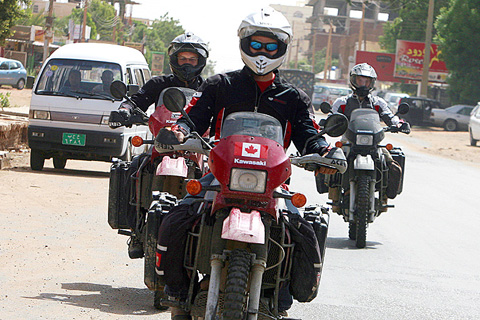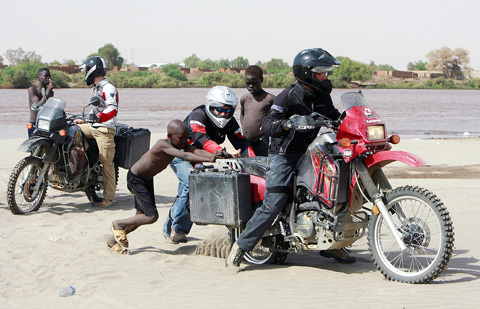After racing through spectacular desert, sleeping under the stars and enjoying boundless hospitality, three Westerners on a motorbike odyssey say they are convinced that Sudan is Africa’s next tourist paradise just waiting to be discovered.
President Omar al-Beshir may be the first sitting head of state in history to face a possible international arrest warrant for alleged genocide and war crimes, but two Canadians and an Englishman are spellbound by the country.
“I’m convinced that in a few years’ time Sudan will be right up there with the other big African countries in terms of tourist spots,” said Tom Smith, on three months’ leave from the Bank of England to bike from London to Cape Town.

PHOTO: AFP
“If it stays like this, you know, has the same appeal, then yeah — I think they’ll be flocking,” added the 25-year-old, on a pit stop in Khartoum with the desert behind them and a two-day run to the Ethiopian border ahead.
More than two years in the planning, their 24,000km ride through Europe, the Middle East, Sudan and down through Africa to the Cape is costing Smith and his Canadian mates a self-financed total of US$60,000.
Inspired by film actor Ewan McGregor and his close friend Charley Boorman who rode BMW bikes from Scotland to South Africa for a television series, the intrepid three are also raising thousands of dollars to help HIV sufferers.

PHOTO: AFP
They were apprehensive about the security situation in Sudan, bogged down in war in Darfur to the west and also trying to recover from a 21-year north-south civil war.
But such fears quickly dissipated after their arrival in Sudan by ferry from Egypt across Lake Nasser.
“The perception of this war-torn country has been the focus of the media, but the experience that we’ve had — nothing could be further from the truth,” said Tyson Brust, a 30-year-old medical student from Toronto.
“It’s probably one of the safer areas in the world, and we found that when we went through. The people were incredibly friendly — everyone was waving us in, wanting us to have breakfast with them and giving us drinks,” he added.
Such comments are music to the ears of a country slapped with US sanctions, blacklisted by Washington as a sponsor of terror and on a diplomatic offensive to save Beshir from the dock of the International Criminal Court.
After driving dirt bikes through Europe, Syria and Jordan and enduring a horrifying crash that left 32-year-old Yarema Bezchlibnyk in pain and weary of “being completely shafted” in Egypt, they say their adventure really began.
Yarema, also a medical student, described the journey from Lake Nasser to Dongola, site of a mediaeval city, as a “spectacular ride, the landscape almost lunar” with rock formations jutting from the desert and blasted by the scorching heat.
“We got into the desert. The sun started to go down and I was thinking ‘wow, I’m in Sudan riding through the desert.’ Just spectacular scenery. This is what it’s all about, this is the adventure,” added Tyson.
They expect to be in Sudan for another week. They have slept under the stars, been invited to stay overnight in village huts and rested at a guest house recommended by a friend of a friend near the UN headquarters in Khartoum.
But it has not all been plain sailing. Stomach upsets from the local cuisine have plagued their advance since Turkey. None is a trained mechanic, so just a flat tire can take half a day to repair. And the heat can be intense.
They are a week behind schedule and need to get to Cape Town in time to fly back for medical school and work. They’ve been away for a month and a half, but at 10,100km have completed only two-fifths of the route.
Smith likened one hotel they stayed in — apparently the best in town — to a POW camp with cell-like rooms where they awoke “absolutely sweltering” because the air conditioning had conked out in a power cut.
Despite having just one guidebook, they are finding their way without GPS and stumbling across tourist gems quite by chance — such as lazing under palm trees next to an ancient Egyptian temple after lunch.
Sudan’s attraction was being able to realize the dream of getting off the beaten track — the trio’s blog is at www.ditchthecomfortzone.com. But from Wadi Halfa to Dongola they also witnessed Sudan’s march to development on the back of oil profits.
“You can see that in a couple of years that (new road) is going to be finished. You won’t need any of the dirt bikes that we’ve kitted out — you can do it on anything,” said Smith.

Cheng Ching-hsiang (鄭青祥) turned a small triangle of concrete jammed between two old shops into a cool little bar called 9dimension. In front of the shop, a steampunk-like structure was welded by himself to serve as a booth where he prepares cocktails. “Yancheng used to be just old people,” he says, “but now young people are coming and creating the New Yancheng.” Around the corner, Yu Hsiu-jao (饒毓琇), opened Tiny Cafe. True to its name, it is the size of a cupboard and serves cold-brewed coffee. “Small shops are so special and have personality,” she says, “people come to Yancheng to find such treasures.” She

In July of 1995, a group of local DJs began posting an event flyer around Taipei. It was cheaply photocopied and nearly all in English, with a hand-drawn map on the back and, on the front, a big red hand print alongside one prominent line of text, “Finally… THE PARTY.” The map led to a remote floodplain in Taipei County (now New Taipei City) just across the Tamsui River from Taipei. The organizers got permission from no one. They just drove up in a blue Taiwanese pickup truck, set up a generator, two speakers, two turntables and a mixer. They

Former Chinese Nationalist Party (KMT) chairwoman Hung Hsiu-chu’s (洪秀柱) attendance at the Chinese Communist Party’s (CPP) “Chinese People’s War of Resistance Against Japanese Aggression and the World Anti-Fascist War” parade in Beijing is infuriating, embarrassing and insulting to nearly everyone in Taiwan, and Taiwan’s friends and allies. She is also ripping off bandages and pouring salt into old wounds. In the process she managed to tie both the KMT and the Democratic Progressive Party (DPP) into uncomfortable knots. The KMT continues to honor their heroic fighters, who defended China against the invading Japanese Empire, which inflicted unimaginable horrors on the

Hannah Liao (廖宸萱) recalls the harassment she experienced on dating apps, an experience that left her frightened and disgusted. “I’ve tried some voice-based dating apps,” the 30-year-old says. “Right away, some guys would say things like, ‘Wanna talk dirty?’ or ‘Wanna suck my d**k?’” she says. Liao’s story is not unique. Ministry of Health and Welfare statistics show a more than 50 percent rise in sexual assault cases related to online encounters over the past five years. In 2023 alone, women comprised 7,698 of the 9,413 reported victims. Faced with a dating landscape that can feel more predatory than promising, many in